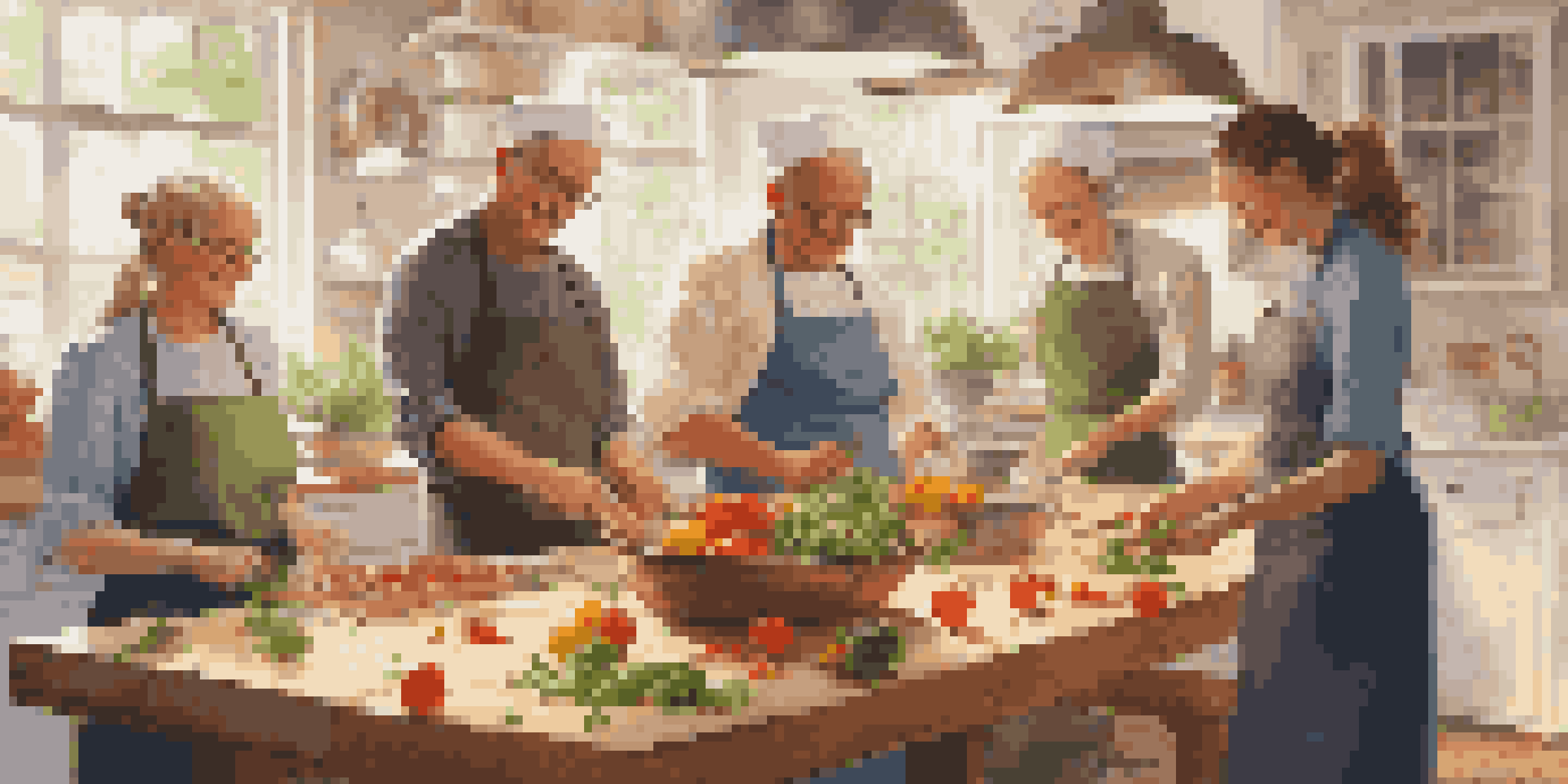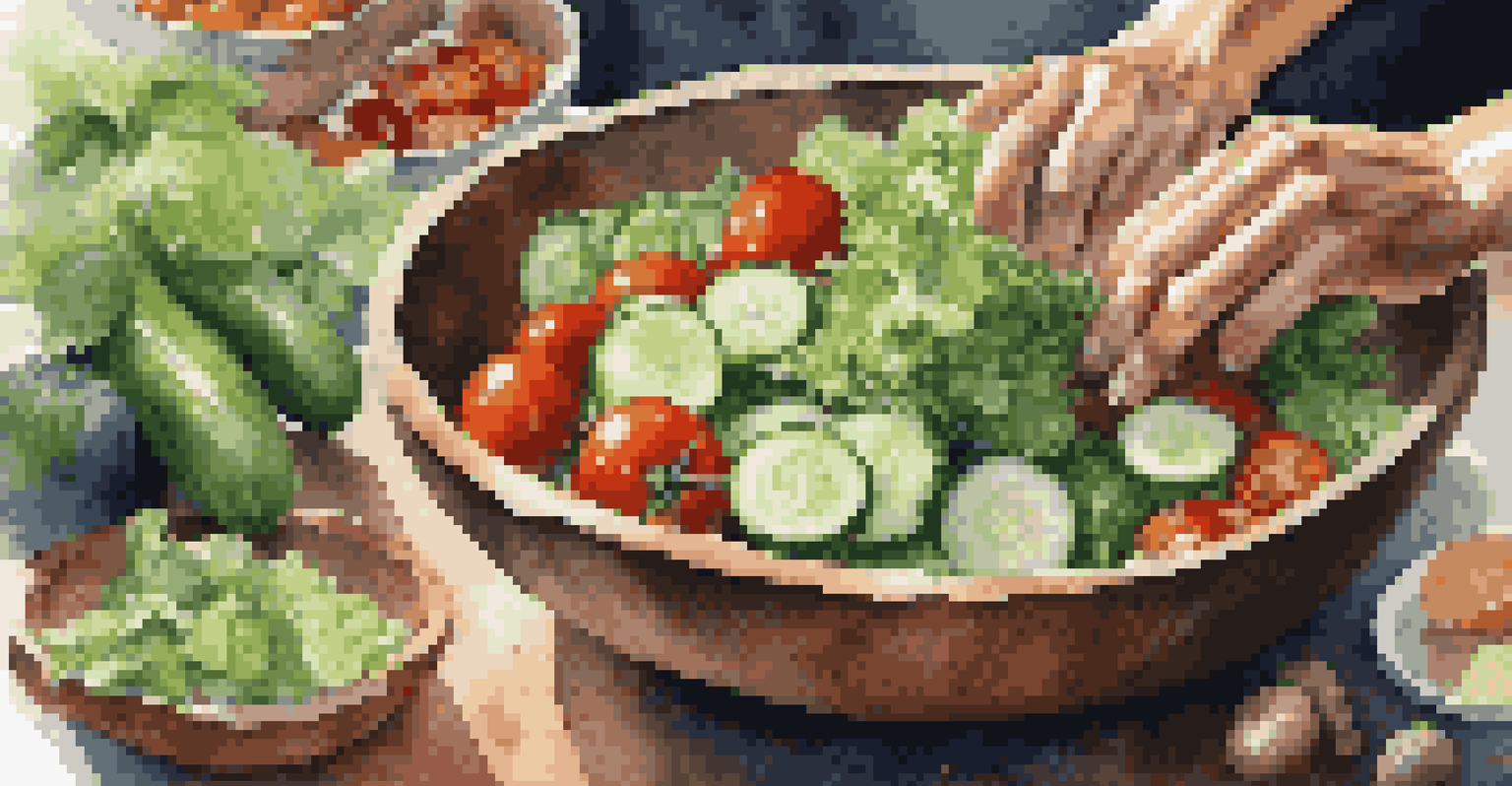The Benefits of Cooking Demonstrations in Health Education

Cooking Demonstrations: An Engaging Learning Experience
Cooking demonstrations provide a hands-on learning experience that captivates participants. Unlike traditional lectures, they engage the audience through visual and practical elements. This active participation can lead to better retention of information and skills.
Food is not just what we eat. It’s how we connect with one another.
When attendees watch a recipe come to life, they not only learn about ingredients but also see how cooking techniques can be applied in their own kitchens. This interactive approach helps demystify cooking, making it accessible to everyone, regardless of their experience level.
Moreover, the social aspect of cooking demonstrations fosters a sense of community. People sharing the experience of preparing food together can create bonds, making the learning experience not only educational but also enjoyable.
Promoting Healthy Eating Habits Through Cooking
One of the primary benefits of cooking demonstrations is their ability to promote healthier eating habits. By showcasing nutritious recipes, these events can inspire participants to make better food choices. Seeing how to prepare healthy meals can motivate individuals to incorporate these options into their daily lives.

In addition, cooking demos often highlight the importance of fresh ingredients and balanced meals. This real-world context helps participants understand the impact of their food choices on health, making the information more relatable and actionable.
Hands-On Learning Enhances Skills
Cooking demonstrations provide engaging, practical experiences that improve culinary skills and confidence.
By encouraging participants to try new ingredients and cooking styles, these demonstrations can help break the cycle of unhealthy eating patterns. A newfound enthusiasm for cooking can lead to a healthier lifestyle overall.
Building Culinary Skills and Confidence
Cooking demonstrations are a fantastic way to build culinary skills in a supportive environment. Participants can learn essential cooking techniques, from basic knife skills to more complex preparations, all under the guidance of an expert. This hands-on practice helps demystify cooking for those who may feel intimidated by the kitchen.
Cooking is like love. It should be entered into with abandon or not at all.
As individuals gain experience, they also build confidence in their cooking abilities. This newfound confidence can encourage them to experiment with recipes at home, fostering a greater interest in cooking and meal preparation.
By empowering participants with skills and confidence, cooking demonstrations can transform how people approach food and cooking, leading to more positive experiences in the kitchen.
Encouraging Mindful Eating and Food Awareness
Cooking demonstrations often emphasize the importance of mindful eating and understanding food sources. By discussing where ingredients come from and their nutritional benefits, participants can develop a deeper appreciation for the food they consume. This awareness fosters a more intentional approach to eating.
Mindful eating encourages individuals to pay attention to their hunger cues and the flavors of their food, which can enhance the overall dining experience. Cooking demonstrations provide an opportunity to explore this concept while preparing meals.
Promoting Healthy Eating Choices
These events inspire participants to adopt healthier eating habits by showcasing nutritious recipes and fresh ingredients.
As participants become more aware of their food choices, they may start making healthier decisions not only during cooking demonstrations but also in their everyday lives. This shift towards mindfulness can contribute to long-term health benefits.
Cultivating Community and Social Connections
Cooking demonstrations create an opportunity for community building as individuals come together to learn and share experiences. This social aspect is crucial in fostering relationships among participants, making the learning process more enjoyable. It can transform a simple cooking class into a memorable event that encourages collaboration and support.
Through shared experiences in cooking, participants can develop friendships and networks that extend beyond the demonstration itself. These connections can lead to ongoing discussions about health, nutrition, and cooking, enhancing the overall impact of the event.
A strong sense of community can motivate individuals to stay committed to their health goals, knowing they have a support system cheering them on. The bonds formed during these demonstrations can lead to lasting friendships centered around healthy living.
Incorporating Cultural Diversity in Cooking Education
Cooking demonstrations can showcase diverse culinary traditions and promote cultural appreciation. By introducing participants to a variety of cuisines, these events broaden their culinary horizons and highlight the importance of cultural influences on food. This exposure can inspire attendees to explore and experiment with different flavors and techniques.
Understanding the cultural significance of certain dishes can also lead to deeper conversations about nutrition and health within various communities. Discussions may arise about traditional ingredients, cooking methods, and how these practices can be adapted for modern health needs.
Building Community Through Cooking
Cooking demonstrations foster social connections among participants, creating a supportive environment for shared learning.
By valuing cultural diversity in cooking education, demonstrations can foster respect and understanding among participants, encouraging them to embrace and celebrate their own culinary backgrounds.
Sustainable Cooking Practices for a Healthier Planet
Many cooking demonstrations now incorporate discussions about sustainability and environmental health. Participants can learn about choosing local, seasonal ingredients that not only enhance flavor but also reduce the carbon footprint associated with food production. This awareness is crucial for fostering a more sustainable lifestyle.
By teaching sustainable cooking practices, these demonstrations highlight the interconnectedness of personal health and the health of the planet. Participants are often inspired to adopt practices like reducing food waste or composting, further promoting sustainable living.

Emphasizing sustainability in cooking can also lead to a sense of responsibility among participants. They become more conscious consumers, making choices that benefit both their health and the environment.